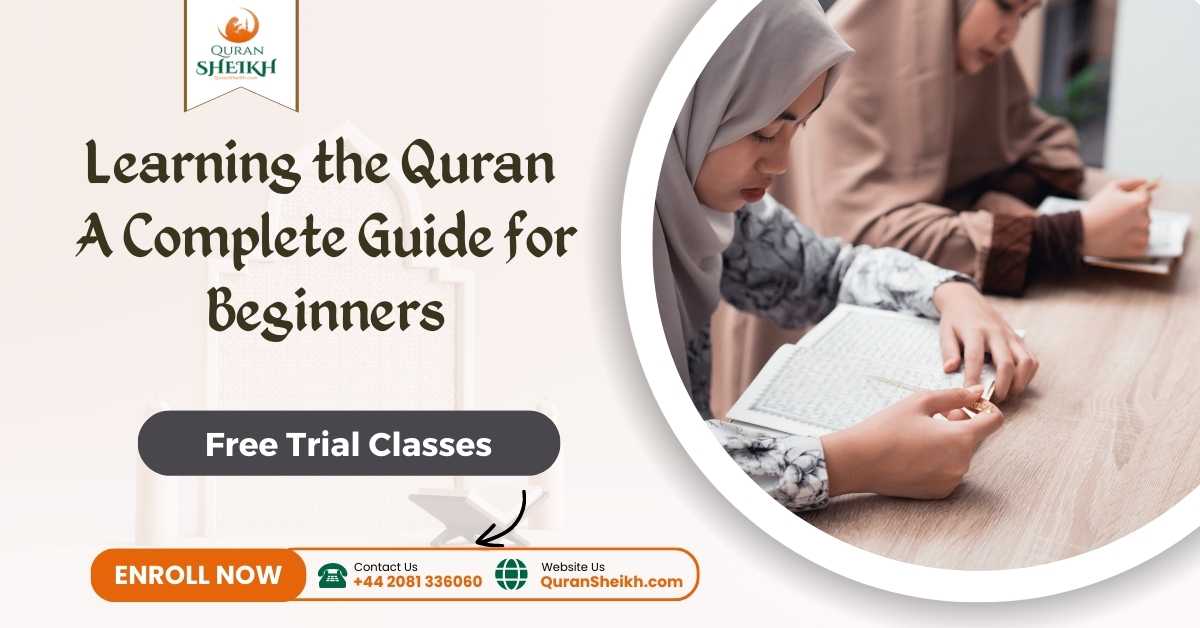Learning the Quran: The Muslim community really respects the Quran. They think it’s Allah talking to them through Prophet Muhammad. They think it’s the best and respected holy book in their religion. Learning about the Quran is important in Islamic education because it can give you a very satisfying feeling.
If you want to learn more about Islam’s traditions and history, or if you are a Muslim trying to get stronger in your faith, understanding the Quran is important.
This article explains how to understand the Quran. It talks about why it’s important, learning Arabic words in it and rules of its structure. Then we look at ways for remembering all those verses besides methods used when reading or reciting them correctly along with showing their value every day too!
We will also think about the good things of learning and understanding the Quran, which helps both for growing yourself as a person plus making society more kind and accepting.
Join thousands of Muslim Families who love learning Quran, Arabic and Islamic Studies from the comfort of their Homes.
Introduction to the Quran: Understanding its Importance
What is the Quran?

People who follow Islam think the Quran is words from Allah. The message was given to Prophet Muhammad (peace be upon him) by Gabriel. This makes the Quran Islam’s sacred book. The holy book of Islam has been saved for more than 1400 years. Its original Arabic text hasn’t changed yet.
What makes learning the Quran crucial?
Muslims stress the need to deeply understand the Quran. They see this not just as a religious duty, but also as the main part of their belief. The Quran gives advice, knowledge and motivation to live a meaningful life. It is believed to give solutions for many kinds of problems, from personal trouble to big issues in society.
Learning the Quran can help Muslims improve their spiritual, mental and emotional feelings. This will make your connection with Allah stronger.
The Basics of Arabic: A Prerequisite to Learning the Quran

Learning the Arabic Alphabet
There are also letters in the Arabic alphabet that do not have equivalents in English, but they still comprise 28 of them.
Learning the Arabic alphabet is something that might first seem scary, but if you keep practicing and really want to do it, this can truly be a fun ride
Arabic Vocabulary and Grammar
To understand the Quran, you need to know Arabic words and rules well. Knowing the basic structure of sentences, changes in verb tense and adjustments to nouns is very important.
Learning Arabic grammar well lets people understand what each word in the Quran means. It helps them see how beautiful and deep it is.
Quran Memorization Course Online with an Arab teacher with 30% Off
Quranic Grammar: Essential Rules to Comprehend the Quran

Parts of Speech in Arabic
To get the meaning of the Quran, it’s important to learn how words work in Arabic. That’s because the Quran is written all in that language. The speech in Arabic can be divided into two categories: Ism (nouns) and Fi’l (verbs). Understanding the role of every word type in a sentence is very important to grasping its meaning.
Verb Forms and Conjugation
Knowing how verbs work and changing them is very important in understanding what the Quran says. In Arabic, there are different kinds of verbs. Each kind has its own structure and use that sets it apart from others in the language. Knowing how to use verbs and change them helps learners understand the deep meanings behind words in the Quran.
Memorizing the Quran: Techniques and Tips for Success
Understanding the advantages of Quranic Memorization
Memorizing the Quran is a great way to learn its teachings because memorization can also help you import real closeness with Allah. Memorizing Quran enhances the carpentry of attention, details memorization and patience in waiting. It also helps us to discipline ourselves better. In Islamic tradition, people who memorized the Quran are greatly revered. It’s because memorizing it is a huge task.
Memorization Techniques and Strategies
There are numerous practices through which one may learn the Quran, such as re-reading it time and again or reciting frequently or even reading word by word. Breaking the chapters into smaller sections and setting a routine time and location to learn can also help memorize better. Skilled teachers or guides can be really helpful to learners.
Tafsir and Interpretation: Studying the Quranic Verses in Depth
What is Tafsir?
Tafsir means to study the Quran verses in order to interpret them, understand how they relate and apply with life & history. It also helps us understand why these words are so significant. This refers to the manner in which words are arranged or constructed, i.e., sentence pattern and linguistic rules associated with it. It contributes to accurately interpreting what it means. Muslims regard knowing the Quran and abiding to its teaching in life. Thus, they use a kind of special science called Tafsir to perform this even better.
Interpretation Techniques and Methods
How and with what tool can anybody understand the Quran? Linguistics is one approach that studies how words used in the text are connected to their meaning and setting.
The method that refers to the consideration of social, political and cultural circumstances at a particular time when the message given in the Quran was followed by Prophet Muhammed is known as a historical method. The Quran deals with broad ideas and themes; that is what we refer to as the thematic approach. It delves into deeper meanings and not just individual words or stories. Such tools assist people to make sense of the Quran teachings better. It therefore enables Muslims to utilize them in the present issues.
Reciting the Quran: Mastering Tajweed and Proper Pronunciation
What is Tajweed?
Tajweed is the skill of reading the Quran correctly. It is a set of rules that controls the way we recite letters, how long vowels sound and our mouth movements while speaking.
Using tajweed correctly preserves the belief in Quran’s teachings, making sure Muslims recite it properly like Prophet Muhammad (peace be upon him) told to do.
Mastering the Art of Quranic Recitation
Learning Tajweed needs hard work and practice. Muslims must learn with a teacher of recitation, he knows all the rules for Tajweed. He can also help them to pronounce words correctly and use a special tone when reciting. By doing it over and again every day, Muslims learn to read the Quran perfectly. Memorizing the Quran is another way to get good at Tajweed and pronounce words better.
Applying the Quranic Teachings to Daily Life: A Personal Journey
Exploring the Relevance of Quranic Teachings
The Quran gives guidance on family issues, learning, money and politics. By learning and understanding its words, Muslims can use what it teaches to deal with modern problems. The Quran gives everyone ideas about kindness, fairness, doing what’s right and tells Muslims to do good deeds. It also helps them grow in the things that really matter spiritually.
Personal Stories and Examples of Quranic Application
The Quran has helped Muslims to find inner peace, make good changes and beat life’s troubles. One example is when a Muslim person had money troubles. They thought really hard and turned to the Quran for advice on what they should do next. By learning the Quran, he found out that hard work, honesty and trust in God are very important.
He changed his way of working and searched for new jobs. This helped him get money-making work that he needed to overcome his financial problems.
Conclusion: The Benefits of Learning and Understanding the Quran
Importance of Learning from the Quran
Muslims should learn and understand the Quran as it assists them in getting a better understanding of their religion’s lessons.
Muslims learn to handle life’s problems from the Quran. It also helps personal development and provides crucial advice on how to live an ethical life that is fulfilled
Getting the Advantages of Knowing and Applying the Quran teachings
People who studied and practiced the instructions of the Quran discovered inner peace, deepened in faiths, and learned on Islamic values.
The daily actions can help the Muslims become good, loving and kind people in society with teachings of the Quran installed. Learning the Quran is a lifetime process, but its benefits extend beyond personal development to improvement of our entire community.
Lastly, Quran learning requires dedication, loyalty and patience.
Learning from the Quran allows you to know more about Islam. It includes its laws, doctrines and ethics. It also assists in enhancing our relationship with God.
Using advice from the Quran in everyday life can make a good change for oneself and society. The Quran gives endless smart advice, encouragement and inspiration. Its lessons are timeless and found everywhere. This article has given you important information and resources to either begin or go deeper in studying the Quran.
How to begin learning the Quran for beginners?
Learning the Quran is a good trip that can make your life better in many ways. It helps guide, inspire and comfort Muslims everywhere around the globe. If you are new to the Quran, here are some tips on how to get started:
- Find a good teacher. This might be the most important step because a good teacher can aid in learning how to recite Quran properly and follow tajweed. Tajweed means rules for saying words correctly from the Quran, This is very essential.
- Start with the basics. This involves learning the Arabic letters, Quran letter categories and simple tajweed rules.
- Be patient and consistent. As reading the Quran consumes a lot of time and effort, it is necessary to be patient but persistent at regular intervals.
- Include it in your everyday routine. Try to spare some minutes for reading the Quran every day.
- Don’t be afraid to pose questions. If you don’t know something, approach your teacher or whoever knows more about reading the Quran and ask for guidance.
Once you know the main rules of Quran recitation, and then begin to understand what it means. There are many different kinds of translations and explanations. You can find one that fits how you learn best. You might also think about joining a group that studies the Quran or signing up for classes on it at your area mosque.
Here are some additional tips that may be helpful for beginners:
- Begin by reading the shorter and simpler parts (chapters) in the Quran first.
- Listen to recordings of Quran recitations. This will help you get the right way to pronounce and rhythm.
- Use Quran-based flashcards or apps to help you learn the Arabic alphabet and vocabulary.
- Look for a person to practice the Quran with and help each other.
- Ask Allah to help you learn and understand the Quran.
Learning the Quran can be hard, but it brings good results. By using these tips, you can make this process simpler and more fun.
Can anybody read Quran?
Yes, anyone can read the Quran. It does not matter what religious faith you profess, or where in the world you live and speak. Really, Muslims are instructed to provide the Quran to others for them to discover its message of peace and kindness.
But Muslims have some etiquette that they observe while reading the Quran. For instance, people are known to cleanse themselves (with a special ablution) before handling the Quran. They also read it nicely and respectfully.
If you are not a Muslim and wish to read the Quran, then there is no shortage of tools available today that can help. The Quran is available in translation to many languages. It’s available with explanations and comments to understand it better. There are also many Quran online and local classes taught by qualified teachers.
Here are some tips for reading the Quran:
- Choose a translation that is easy for you to read and comprehend.
- Look for a quiet place where no one would disturb you.
- Sit properly and place the Quran in your hands with respect.
- Start with the Fatihah, which is known as Quran’s chapter one.
- Read slowly and carefully, think about what the verses are saying. Then think of their meaning in your own mind.
- If you do not get something, sit with a teacher that knows more than others.
Reading the Quran can be a great and satisfying experience for people of any religion. It is a place where Muslims all around the world get wisdom, help and inspiration.
Are Muslims supposed to memorize the Quran?
Some argue whether Muslims actually have to memorize the Quran or not. Some of them believe that it’s their religious obligation to learn the Quran by heart. Some people are believed to believe that understanding what the Quran means is enough for them even if they can’t recite it all perfectly well.
This is a controversial matter among Islamic experts. Some scholars believe that the Quran suggests for us to memorize it entirely; however, other people find sections of verses in it they think do not support this.
Whether you want to memorize the Quran or not is up to your will. There is no right or wrong decision, and people must decide what best suits them by being a Muslim. People should choose their behavior in accordance with their own beliefs and the life situation.
Here are some of the benefits of memorizing the Quran:
- It can assist you in grasping the Quran easily.
- It can help you establish a deeper relationship with Allah.
- It can help you to be disciplined and attentive.
- It can help you sharpen your memory and thinking power.
- It may assist you to be away from evil thoughts and refrain yourself from doing wicked actions.
But just remember, you don’t have to memorize the Quran so that you become a good Muslim. This is the key aspect it has to understand by heart, and live according to the Quran as closely as you can.
Best Quran memorization program with qualified Arab tutors and get 30% OFF, Quran classes for Kids
FAQs
Is there a need to be an Islamic follower in order to study the Quran?
The Islamic belief is not a prerequisite for one to learn the Quran. The Quran is a treasure of wisdom and inspiration for people even from different religious and cultural backgrounds.
Do I need to know Arabic to learn the Quran?
Arabic basics are an important foundation to understanding the Quran. Knowledge of classical Arabic should be considered a fundamental foundation in decoding the message and meaning behind the Quran.
Is memorizing the Quran necessary?
Memorizing the Quran is not compulsory in Islamic tradition; it only meant to be recommended. Quran memorization is considered to be a worship and it has many spiritual virtues.
Can I learn the Quran by myself?
While self-study is allowed for studying the Quran, ideally it will help to find a good teacher or learning center that can guide you. Being an expert in the Quran means that one needs to have full knowledge of Arabic vocabulary; grammar rules as well interpretation skills and a tutor who guides him through every step.


